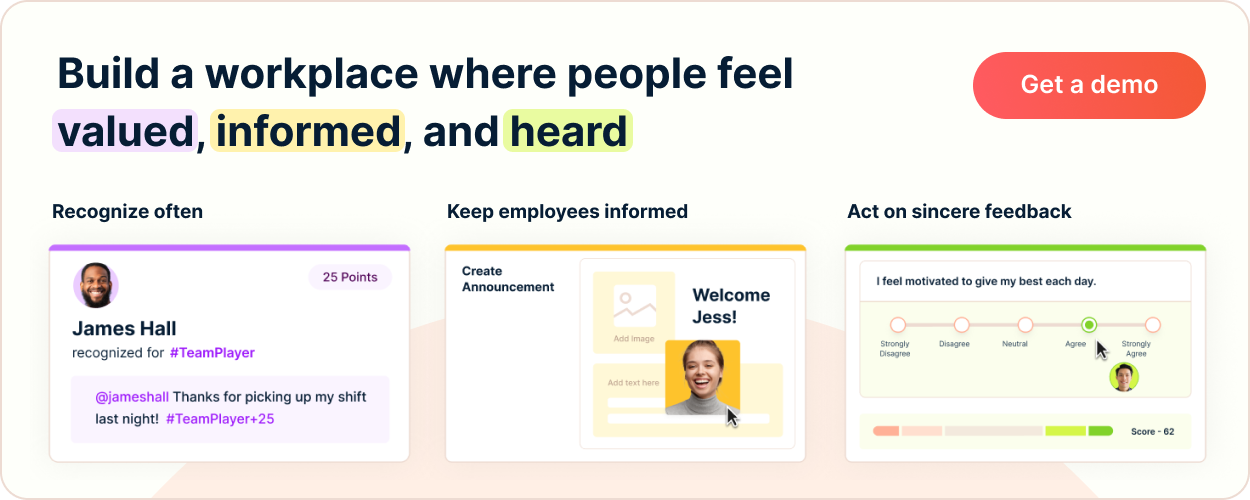How To Support Veterans In The Workplace With 8 Thoughtful Strategies

Over 200,000 military personnel transition from active duty to civilian life every year, joining 16.5 million US veterans. Armed with considerable skills and military experience, the road ahead is unknown and often bumpy for people who have never worked in the corporate world.
This guide unravels the challenges ex-military members face, strategies for supporting veterans in the workplace, and how companies will benefit from investing in people from military backgrounds.
Why Should Companies Support Veterans In The Workplace?
Heartbreaking research in 2021 revealed that 30,177 active duty personnel and veterans have committed suicide since 9/11. This is in contrast to the 7,057 service members killed in combat during those same 20 years.
Welcoming veterans into your workplace and honoring them for their tremendous contributions and years of service is the right thing to do. But there's also a strong business case for adding ex-military employees to your organizational line-up, including these five benefits:
1. Level Up Your Organizational Skills
The global talent shortage has reached a 16-year high as companies struggle to find employees with the right skills to drive their business forward. Tapping the veteran market can support businesses in filling organizational skills gaps, but many employers overlook this rich source of talent.
Speaking on the US at Work podcast, Stan Kimer, VP of Training for the National Diversity Council, explains:
“Employers have misconceptions or unconscious bias thinking that all military people just know how to hang out in foxholes and shoot guns and don't realize that there's a lot of other support jobs in the armed services where veterans are gaining a lot of very valuable skills.”
Northeastern University notes the ten top transferable skills that military candidates could include on their resumes:
- Leadership
- Financial Responsibility
- Self-Sufficiency
- Effective Communication
- Integrity
- Technology Skills
- Teamwork
- Ability To Perform Under Pressure
- Quick To Adapt
- Problem-Solving

2. Support DEI Goals
A third of active duty military personnel identify as being from racial minority backgrounds, so it follows that hiring veterans could support your diversity, ethnicity, and inclusivity strategies.
Stan Kimer explains that people from diverse backgrounds provide considerable value to an organization through their different perspectives and access to a broader audience your business may wish to target.
“When you hire veterans, they bring a special diversity that they can look at solving problems in different ways to other people. They can look at product design, and if you want to penetrate the market of service members and veterans with new products and services, they can bring their insight so you can make revenue.”
3. Earn Tax Credits
The Work Opportunity Tax Credit (WOTC) is a federal tax credit available to employers who hire individuals from certain targeted groups, including veterans. The WOTC encourages employers to hire individuals who may have faced barriers to employment, such as veterans who have recently been discharged or are on long-term unemployment assistance.
Eligible employers may receive a $2,400-$9,600 credit, depending on the target group and the employee's hours.
4. Benefit From Their Resilience
Alongside their breadth of skills and years of loyal service, veterans also bring grit and determination to the workplace that isn't commonplace across the civilian workforce. Jason Hennessy, Risk & Security Contractor for Anthem Risk Security, describes the list of characteristics veterans possess as, “Flexibility, adaptability, focus, drive, and resilience. Traits that are ingrained into nearly every service member and are (or should be) coveted by most companies.”
If companies must respond to sudden industry disruption or navigate difficult times, the skills and attitudes of veterans can be invaluable.
Robbie Bain is an excellent example of a veteran forced to lean on his military-taught resilience after being made redundant within a year of transitioning back to civilian life. Here's how he handled the knock to his confidence:
“Two days after learning that my role was no longer required, I faced a critical decision: to allow despair and worry to engulf me or to use this setback as an opportunity to grow. I chose the latter, resilience really is a super strength of military training, so I set my sights on a new goal—book my next Salesforce exam, "Salesforce Advanced Administrator," and passed.
I can honestly say that I am more determined to embrace the challenges ahead whether it be within the Salesforce Ecosystem or within a different sector, I know now that I can achieve high in whatever is put in front of me."
5. Improve Leadership
Not all veterans have experience leading other service members, but even those with junior-level backgrounds can demonstrate an impressive understanding of what it takes to be a great leader. Joel Kam, Senior Human Resources Advisor at the Canada Revenue Agency, agrees,
"One thing I think often gets missed is that vets at all levels make really good supervisors and managers, able to plan, organize, prioritize, and make decisions within their authorities. While we might not be technically proficient in the work domain, we learn fast, and we get stuff done. Based on what I have witnessed since retirement, private and public sector needs a ton more of this."

What Challenges Do Veterans Face In The Workplace?
The benefits of employing veterans are plentiful, yet many face challenges adapting to the civilian workplace. Here are some of the top roadblocks and stereotypes vets encounter before, during, and after their transition:
1. Gaining Work And Fair Compensation
Achieving an offer of employment is the first hurdle for many veterans. Liberty Street Economics reports that veterans are 18% more likely to be out of work than comparable nonveterans in terms of education and disability status. And veterans who do secure work earn 12% less than nonveterans.
2. Translating Military Into Civilian Skills
It can be challenging for veterans to understand how their capabilities are valuable in the corporate world.
Talent acquisition teams and hiring panels don't have insights into what vets have learned in the military, so it's up to the applicants to translate this for potential employers. Stan Kimer explains they must be able to “convert their military skills into civilian language and articulate the skills they built up in the military and how that would apply in the civilian workforce.”
The difficulty here is that just as employers don't understand military life, new veterans may not yet grasp what they can bring to a corporate role either. Peter Deane, Founder, and MD of Expertise Consultancy Ltd., highlights an additional challenge: self-promotion.
"Every military veteran I've met in the civilian workspace is terrible at this one skill. We have it ingrained in us from the beginning of our military careers, and we carry it with us after we leave.
Self-promotion is our Achilles heel. We tend to shy away from self-promotion and talking about our successes. Simultaneously, we’re quick to point out our flaws and shortcomings. This is fine in the military as “bragging” is just not something we do, especially when surrounded by colleagues who also have done the same things and more.”
For veterans to find a role that suits their skillset and offers developmental potential, they must be able to explain what they bring to the table and how it benefits the organization. If the employer has to jump through hoops to figure it out, they will likely pass and find someone else.
3. Hirers Perceiving Lack Of Education
Many organizations unfairly discriminate against veterans, perceiving them to be uneducated. Not only is this a blatant example of unconscious bias at play, it's also incorrect. The US Chamber of Commerce reveals that more than 1 in 3 veterans holds a Bachelor's degree, and less than 5% lack a high school diploma.
4. Assuming That All Veterans Have PTSD
Active service personnel are exposed to combat, war zone deployment, training accidents, military sexual trauma, and many other harrowing events that could lead to post-traumatic stress disorder (PTSD.)
7% of veterans will experience PTSD at some point in their life, which is slightly higher than 6% of the general civilian population who will also be diagnosed with this condition. Yet, employers incorrectly assume that hiring a veteran risks inviting people with "baggage" into the team, a preconception witnessed by Clifford Jamieson, HR Business Partner at KF Aerospace:
“As a veteran and now HR professional, many civilian employers wrongly think that all military veterans, especially Afghanistan war veterans, have PTSD. It is a civilian mindset that needs to change.”
Similarly, CAF veteran Bettina McCulloch-Drake argues that discriminating against someone for having suspected PTSD is as stigmatic as assuming that other employees who require mental health support can't do their jobs well. She explains:
“Believing that people with mental health issues, including PTSD, cannot be effective and productive members of any workplace or community is a belief that really needs to be debunked. Depending on the severity, most mental health issues can be managed with sound and consistent treatment.”

5. Adapting To A Less Physical Lifestyle
One less obvious change that ex-military personnel must get used to is a significant reduction in physical activity when they enter the corporate world. Zachary Green, Managing Partner of Warrior Enterprises, explains the impact of moving from a physical to a mental workload:
“Service in the military is synonymous with constant motion—the running, the training, the sheer physical exertion. It's this continuous movement that fosters a connection between the mind, body, and spirit.
However, once military service ends, many veterans find themselves breaking away from this routine, and they opt for a more sedentary lifestyle. This sudden shift often triggers an avalanche of negative repercussions.”
It is well-cataloged that physical activity produces a slew of health benefits for the mind and body, including enhanced mood, lower stress, and lower rates of depression. Unfortunately, these benefits can diminish when exercise subsides.
6. Convincing Leaders They Can Take Initiative
Military personnel are accustomed to taking orders and following a chain of command, which is an asset in corporate environments. However, some leaders may be reluctant to trust veterans to take initiative. As a result, they may be less likely to promote or recognize the efforts of veterans who step up and go above and beyond their job description.
7. Concerns About Redeployment
Leaving the military isn’t always as permanent as it sounds. In certain situations, such as wartime, or national emergencies, veterans, including those who have joined the reserves, may be recalled.
Employers are nervous about hiring and training people who may leave suddenly, resulting in yet another role vacancy. Veteran candidates invited to a recruitment interview may be asked to explain the condition of their military contract, so the employer can determine whether there's a redeployment risk.
8 Tips For Including Veterans In The Workplace
Successfully hire veterans to join your organization by following the tips and best practices below. You'll support their transition throughout the application and onboarding stages to set them up for a positive employee experience:
1. Follow A Skills-Based Hiring Approach
LinkedIn's 2023 Future of Recruiting report reveals that 75% of recruiting professionals plan to prioritize skills-based hiring over the next 18 months. This practice is good news for veterans, as it avoids making assumptions about their military backgrounds and instead focuses on their ability to succeed in the role. Skills-based hiring involves:
- Determining which skills and capabilities are essential for a given role, then recruiting candidates with the right knowledge, regardless of background
- Ignoring resumes, past employer references, or historic salary details
- Using work samples or aptitude tests to indicate if a candidate has the necessary skills to perform the role
- Anonymizing candidate identifiers such as their name, age, address, or employment history
2. Clarify Your Company’s Mission
Service personnel thrive on having a purpose, a north star to work toward, as they do in every military mission they undertake. Use this to your advantage by clarifying your company's mission during the hiring and onboarding process so your veteran hires understand what they're working for and why.
Nectar Tip: A company mission statement is the bedrock of your company culture. If yours is an old document you haven't revisited in years, this is a great time to evaluate whether it's still meaningful and update it accordingly. Include your company values, aspirations, and the broader impact you hope to make, then redistribute to your staff.
3. Encourage Team Building
Camaraderie is everything to people who have spent any time in military service. Living and socializing in close quarters with other military members may be something that veterans miss when they leave the service.
Zachary Green explains, "In the military, your team is your second family. Together, you share laughter, tears, triumphs, and sometimes even squabbles. This bond, it's incredibly potent and invaluable. But the moment you step out of the military, it vanishes.”
While it's impossible for employers to entirely replicate the bond between military members who stand side by side in battle, nurturing close workplace relationships is still essential. Forge friendships and social connections through team-building activities for your on-site, remote, or hybrid team members, and use icebreaker questions as a fun way for new joiners to get to know other employees.

4. Provide Frameworks
Vets are familiar and comfortable with rigid frameworks and processes in the line of duty. Their previous work experience has been built on ranks, rules, and structure. Use this to your advantage by explaining the following to help them settle in:
- Org charts so they understand the chain of command and how their role fits into the overall business
- Skills competency frameworks to understand what they need to learn or demonstrate to move to a different role or earn a promotion
- Performance management and feedback culture processes to support their continuous growth and development
5. Create Veteran Ambassadors
If your company already employs veterans, ask them to become veteran ambassadors and offer support to new ex-military personnel during onboarding and throughout their tenure: The ambassador role may include:
- Signposting resources: Veteran ambassadors can guide new employees to internal programs for professional development, mental health resources, or local veteran support groups.
- Being an advocate: Veteran ambassadors can advocate for the needs and interests of veterans within the organization. This could involve raising awareness of veterans' issues or assisting in developing veteran-friendly policies and procedures.
- Networking: By introducing new veteran employees to other veterans in the company, ambassadors can help them build a supportive network, easing their transition and fostering a sense of belonging.
6. Set Up Veteran Employee Resource Groups
Similarly, employee resource groups invite fellow veteran employees to gather regularly and share their experiences, struggles, and tips about transitioning back to civilian work.
Stan Kimer explains the value of ERGs to minority groups and how they can lead to beneficial mentoring partnerships.
“A lot of companies are doing something quite innovative, forming employee resource groups for black employees, LGBTQ, women, Hispanic, and groups for veterans. They set up mentoring programs where you might have a veteran working successfully for five or six years that can mentor a new veteran coming into the workforce and help them acclimate to the corporate world.”

7. Add Veteran Spouses To Your Talent Pool
Many military and veteran spouses exhibit extraordinary skills and strengths that could be an asset to your internal talent pool. And as 92% of them are women, according to the US Chamber of Commerce, this will also strengthen your diversity initiatives. Here’s what they could bring to the table:
Resilience And Flexibility
Military life can be unpredictable, involving frequent separations and adjustments to new environments. Veteran spouses often demonstrate remarkable resilience in adapting to change, overcoming challenges, and maintaining a positive attitude in the face of adversity. This adaptability translates well into a variety of work settings.
Communication Skills
Frequent relocations and deployments mean veteran spouses must maintain connections with family members, support networks, and military officials. This can produce strong interpersonal, written, and verbal communication abilities.
Cultural Sensitivity
Military families often interact with people from diverse backgrounds due to their exposure to various locations and cultures. This develops a heightened ability to work effectively with individuals from different cultural backgrounds.
8. Pay For Mental Health Benefits
Let's repeat: hiring a veteran doesn't automatically mean you're hiring someone with PTSD or mental health issues. But starting a new job, even for a general civilian worker, can be a significant life event with which any of your employees may require extra support.
Companies that offer employee wellness programs, including mental health perks such as counseling or access to mindfulness meditation apps, can create holistically healthy employees. A Metlife study finds that these well-balanced employees are 74% more satisfied with their job and 53% more likely to be productive, which is a solid reason to invest in your people.
3 Examples Of Companies That Support Veterans At Work
Check out these three examples of companies that already recognize the value of hiring veterans:
Boeing
Boeing has hired 15,500+ veterans since 2010, comprising 15% of its workforce. The company also supports hundreds of military and veteran-specific programs and organizations, awarding $13 million to 116 veteran charity organizations in 2022 alone. Boeing offers the Skillbridge program, which translates veteran leadership, integrity, and critical skills to relevant corporate roles. In terms of physical and mental health, the company provides recovery and rehabilitation programs that focus on PTSD, mental and physical injuries, and suicide prevention.

Love’s
Retail chain Love's is another example of a company using the Skillbridge program to support transitioning service members who are goal-oriented, disciplined, and results-driven. The program allows personnel to use their last 180 days of service to train and learn with Love's for a smooth transition back into civilian life. Love's is a good match for veterans and military spouses who want to apply their knowledge, skills, and leadership experience in customer service positions.

Palo Alto Networks
Cybersecurity firm Palo Alto Networks believes its company’s core principles of collaboration, inclusion, and integrity overlap perfectly with the values held by people who have worked in the Armed Services. The company’s recruitment panel is committed to hiring and developing veterans across every business function, enabling them to forge successful cybersecurity careers to protect the world from a different type of threat.

Become A More Inclusive Workplace With Nectar
Hiring veterans to join your ranks is a great start. But the real magic begins when managers and peers commit to supporting and including vets in a working environment that's the polar opposite of military life.
Nectar can help you build a workplace culture where veterans feel welcomed, appreciated, and supported daily. Use our Challenge tool to encourage employees to join a veteran ERG or volunteer at a veteran's charity.
Similarly, our Recognition tool is a great way to highlight veterans' outstanding contributions and reassure them they're all set to enjoy a rewarding career outside the military. Use the shoutout function to offer praise and award Nectar points, which they can redeem for Rewards, including Amazon products, gift cards, company swag, charity donations, or custom rewards.
Ready to make your veteran employees feel valued? Sign up for a free Nectar demo today.














